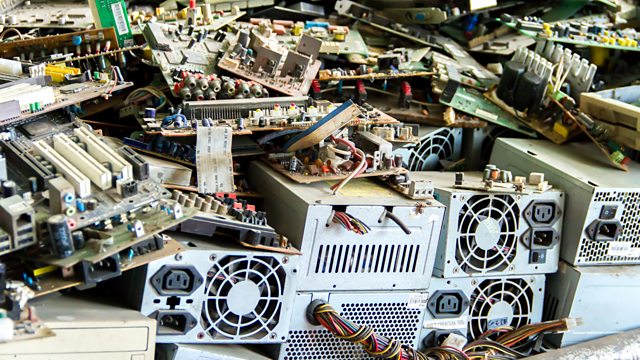Growth in Global E-waste
The alarming growth of global e-waste; Documenting the plight of Rohingya people; MSF using tech to aid Rohingya people; Mobile phones as lifelines for migrants and refugees
A new report on global e-waste, discarded products with a battery or plug, shows 44.7 million metric tonnes generated in 2016 - up 8% from 2014. Click talks to one of the report鈥檚 authors, Ruediger Kuehr, from the United Nations University.
With many Rohingya people crossing the border from Myanmar to Bangladesh, the camps at Cox鈥檚 Bazaar are becoming much bigger than they have ever been, with one million people expected to arrive by the end of the year. With limited access to the internet or mobile phones, Rohingya people are finding it hard to document the situation themselves. Click鈥檚 Lauren Hutchinson reports from Dhaka in Bangladesh.
MSF has been busy helping refugees and other displaced Rohingya in targeting disease and providing medicine and aid. Click talks to Sam Taylor from MSF about how the tech community can help.
Migrants often lose their phones along routes (which are confiscated at border crossings or by militias). Migrants will often share one communal phone which gets charged along the route. Fifty five percent of migrants interviewed in Libya reported having travelled with a personal mobile phone. Forty five percent of them had a smartphone. Click talks to Sonia Joly from the Danish Refugee Council.
(Photo caption: Electronic waste ready for recycling 漏 Getty Images)
Producer: Colin Grant
Last on
More episodes
Previous
Broadcasts
- Tue 19 Dec 2017 20:32GMT主播大秀 World Service Online, Americas and the Caribbean, UK DAB/Freeview & Europe and the Middle East only
- Tue 19 Dec 2017 21:32GMT主播大秀 World Service Australasia, South Asia & East Asia only
- Wed 20 Dec 2017 05:32GMT主播大秀 World Service except Australasia, East and Southern Africa, News Internet & West and Central Africa
- Wed 20 Dec 2017 07:32GMT主播大秀 World Service Australasia & East and Southern Africa only
- Wed 20 Dec 2017 15:32GMT主播大秀 World Service Australasia
- Wed 20 Dec 2017 18:32GMT主播大秀 World Service East and Southern Africa & West and Central Africa only
- Thu 21 Dec 2017 03:32GMT主播大秀 World Service West and Central Africa
- Christmas Eve 2017 01:32GMT主播大秀 World Service except News Internet
Podcast
-
![]()
Digital Planet
Technological and digital news from around the world.


